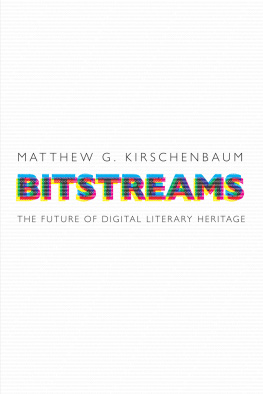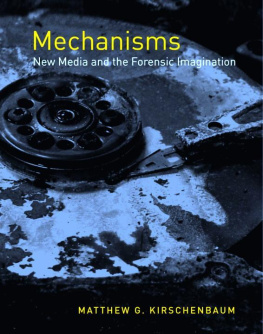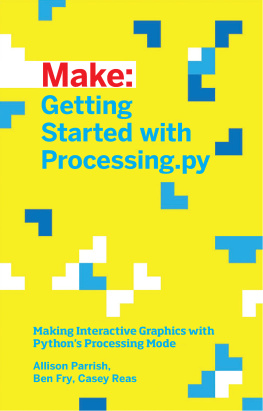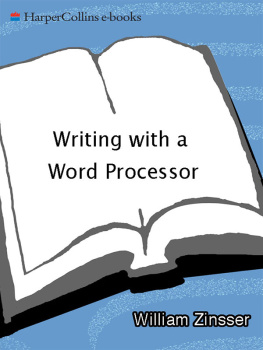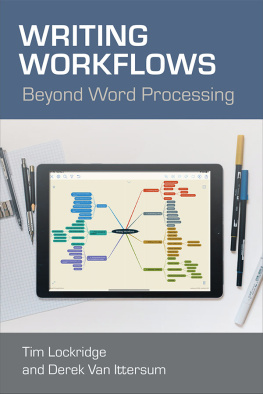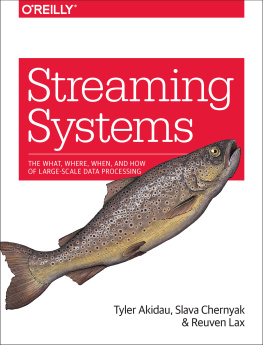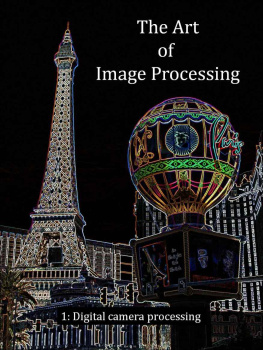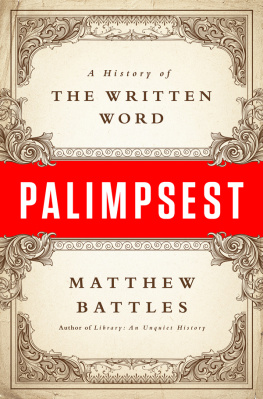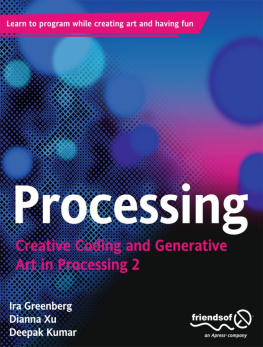TRACK CHANGES
A LITERARY HISTORY OF WORD PROCESSING
MATTHEW G. KIRSCHENBAUM
THE BELKNAP PRESS OF
HARVARD UNIVERSITY PRESS
Cambridge, Massachusetts
London, England
2016
Copyright 2016 by Matthew G. Kirschenbaum
All rights reserved
Many of the designations used by manufacturers and sellers to distinguish their products are claimed as trademarks. Where those designations appear in this book and Harvard University Press was aware of a trademark claim, the designations have been printed in initial capital letters.
Jacket design: Tim Jones
978-0-674-41707-6 (alk. paper)
978-0-674-96944-5 (EPUB)
978-0-674-96945-2 (MOBI)
The Library of Congress has cataloged the printed edition as follows:
Names: Kirschenbaum, Matthew G., author.
Title: Track changes : a literary history of word processing / Matthew G. Kirschenbaum.
Description: Cambridge, Massachusetts : The Belknap Press of Harvard University Press, 2016. | Includes bibliographical references and index.
Identifiers: LCCN 2015041450
Subjects: LCSH: Word processingHistory. | WritingTechnological innovations. | Creation (Literary, artistic, etc.)Technological innovations.
Classification: LCC Z52.4 .K57 2016 | DDC 005.52dc23 LC record available at http://lccn.loc.gov/2015041450
For my parents,
Arlene and Mel,
Who brought home an Apple
CONTENTS
Well, salvage whatever you can, threadbare mementos glimmering in recollection.
Ecclesias (a word processor) in Henry Roth, A Star Shines over Mt. Morris Park (1994)
Track Changes began, as many books do, with a question: What was the first novel written with a word processor? Being an English professor interested in the history of writing as well as computers, I thought it was the sort of thing I should know, but I didnt. It is a commonplace of literary history that Mark Twains long, meandering memoir Life on the Mississippi (1883) was the first piece of belles lettres to be submitted to a publisher as a typescript: I was the first person in the world to apply the type-machine to literature, he informs us in a sketch written some years after the fact and featured in an ad by the typewriters manufacturer, Remington, otherwise best known for firearms. (James is typically thought to have begun dictating his prose after he suffered a repetitive strain injury writing by hand.) But when it came to computers and word processing, it appeared there were no widely recognized historical counterparts to Twain and his typist.
In the course of my research I was able to answer my question to my own satisfactionthat is what researchers do after all, and thus my candidates for who was first are duly presented in the pages that follow. But firsts are always relativeboth to what came before and to what came after. In my case the answer largely depended on how I chose to define terms like write and word processor. As historian Michael R. Williams explains in his discussion of the competing contenders for the mantle of who built the first computer, if you add enough adjectives to a description you can always claim your own favorite. Besides the inevitable proliferation of criteria, though, the question of who was first also usually implies a linear, causal view of historical progress, often circumscribed in the telling by a great mans genius and imagination (my gender specificity here is intentional) and the resulting technological marvels overtaking a passively accepting public. Word processing, however, permits us none of these simplifications, as even a casual survey of its history will show. Does word processing belong to the history of writing or the history of computing? The answer is not obvious. The conjoining of the word word with the word processing or processor has at various times been used to denote principles of office management, an actual person (typically female), a physical hardware device, or a piece of intangible software. It has also encompassed not only the written production of text with a keyboard but also verbal dictation, shorthand note taking, and the duplication, mailing, and filing of documents.
There is another kind of first associated with any technology as pervasive as word processing, at least for those of us of a certain age: Each of us remembers our own first time. I am just old enough to have lived through word processings popular advent, but my own personal experience is one of solely vicarious contrasts. Going into my adolescence I had never used a typewriter for any purposeful task; but I knew that one of the hallmarks of the transition from grade school to middle school was that handwritten reports were no longer acceptable. I vividly remember the family typewriters periodic appearances on our kitchen table whenever my older brother or sister had a school paper to write. It was a big, heavy, noisy thing. The volume of the television set in the adjoining family room would rise accordingly. I remember my siblings exertions over the unforgiving apparatus and my own sense of mild dread, knowing my turn was almost at hand. (Such were the pallid anxieties of my coming of age in suburbia.) And then, miraculously it seemed, the home computer arrived, the product Time magazine gave its cover to in January 1983 as the Machine of the Year. My family bought an Apple IIe, and with it a very simple word processing program called the Bank Street Writer. Accompanied by a screeching dot matrix printer, I used the Apple to write my school papers as well as reams of juvenile science fiction and fantasy. I quickly learned to insert and delete, move blocks of text, and find and replace words and phrases. (Features such as spell- and grammar-check and any kind of advanced formatting were beyond the programs capabilities.) The tearing of the spindled edges from the fanfold paper signaled that a job was complete. As for the typewriter, it was unceremoniously relegated to the back of the closet, where it was soon forgotten, and so technological progress and middle-class privilege had conspired to let me sidestep a rite of passage that only a few years earlier had seemed inevitable.
Writing Track Changes (mostly in Word, on a couple of small, lightweight laptops) has taken me back to a time in my youth that I recognize only in retrospect as the pivotal moment in the growth and widespread adoption of word processing for literature. Many of the writers I stayed up late reading as a teenagerbest-selling authors like Stephen King, Frank Herbert, Anne McCaffrey, and Tom Clancywere themselves experimenting with the technology, getting their own first computers at more or less the same time we got our Apple. (Clancy got an Apple IIe himself, in fact.) All of this explains one of the attractions of this project to me: a chance to explore some of the connections that tied me, a kid in my upstairs bedroom poking around with the Bank Street Writer or Apple BASIC, to the writers I idolizedwho were also, it turns out, wrestling with the very same technology themselves. They were learning the same jargon and terminology that I was, scratching their heads over dot matrix and ink jet, and struggling to initialize a diskette or recover a file they had just inadvertently deleted. It was a leveling moment of sorts, and for me, that realization served to humanize these famous authors.
Of course those are not my only motives. Almost from their inception during and after the Second World War, modern digital computers processed letters just about as easily as they did numbers. This was in the nature of the computer as a general-purpose machine for manipulating and storing arbitrarily encoded symbols, as noted by the technology historian Thomas Haigh.
Which is not to say that the place of word processing in literature is now settled, or that its past is easily divisible from its present. I am completing this book at a moment when, for the first time in over two decades, the word processing market is no longer dominated by a single enterprise-level package. Alternatives to Word, ranging from so-called artisanal software tools like Scrivener or WriteRoom to cloud-based apps and services, now offer more choices in our digital writing environments than at any time since the early 1980s. Screens are both expanding in size (through plasma technology) and contracting (the supercomputers in our pocket we still plaintively call phones). Voice recognition, which allows us (like Henry James) to write simply by speaking, is an everyday option. Text itself has become a verb.
Next page

